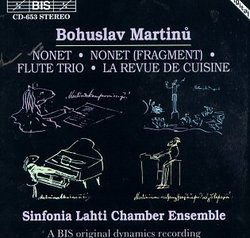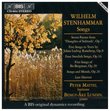| All Artists: Bohuslav Martinu, Sinfonia Lahti Chamber Ensemble Title: Bohuslav Martinu: Nonet; Nonet (Fragment); Flute Trio; La Revue de Cuisine Members Wishing: 1 Total Copies: 0 Label: Bis Release Date: 11/21/1995 Album Type: Import Genre: Classical Styles: Ballets & Dances, Ballets, Chamber Music, Historical Periods, Modern, 20th, & 21st Century Number of Discs: 1 SwapaCD Credits: 1 UPCs: 789368270828, 7318590006535, 731859000653 |
Search - Bohuslav Martinu, Sinfonia Lahti Chamber Ensemble :: Bohuslav Martinu: Nonet; Nonet (Fragment); Flute Trio; La Revue de Cuisine
 | Bohuslav Martinu, Sinfonia Lahti Chamber Ensemble Bohuslav Martinu: Nonet; Nonet (Fragment); Flute Trio; La Revue de Cuisine Genre: Classical
Bohuslav Martinu began his musical studies in Prague, but he only really came of age in Paris in the 1920s, where he was for a time a student of Albert Roussel. They must have been interesting lessons, for Martinu spoke ... more » |
Larger Image |
CD Details
Synopsis
Amazon.com
Bohuslav Martinu began his musical studies in Prague, but he only really came of age in Paris in the 1920s, where he was for a time a student of Albert Roussel. They must have been interesting lessons, for Martinu spoke not a word of French, and Roussel spoke nothing else. One of the strongest influences on Martinu was jazz, something else far from Roussel's aesthetic, and his little chamber ballet "La Revue de Cuisine" (Kitchen Review) made a strong impression on contemporary audiences--as indeed it does today. It's one of the best classical-jazz fusion pieces, including a smoky-toned tango and a riot of a Charleston. The Nonet, by contrast, comes from the very end of the composer's career (as does the Trio) and it's a haunting essay in neoclassical purity, with some lovely melodies. Performances and sound are tops. You'll love this disc. --David Hurwitz
Similar CDs
| Peter Mattei, Wilhelm Stenhammar, Bengt-Ake Lundin Stenhammar: Songs Genres: Pop, Classical Label: Bis | |
| Syl Johnson This Time Together Genres: Pop, R&B Label: Zoo Records/Labrador | |
| Chiffons Greatest Recordings Genres: Pop, R&B, Rock Label: Ace Records UK | |

 Track Listings (11) - Disc #1
Track Listings (11) - Disc #1
